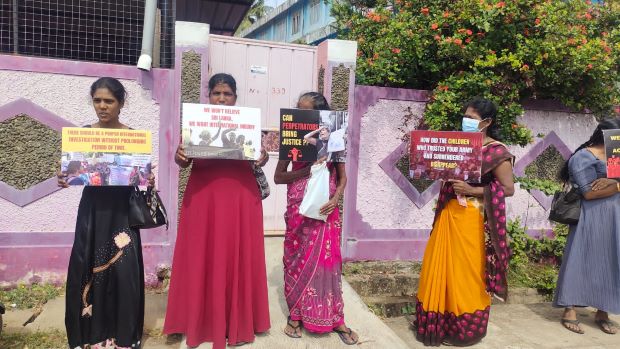Will presidential candidates address the missing persons’ issue?
By Husbera Haleem
‘How did our children who were entrusted with your army go missing?’
‘Stop harassing and intimidating the families of the disappeared’
‘We are not asking for compensation or death certificates. We demand a proper judicial inquiry.’
These were some of the slogans carried by demonstrators at the vigil organized by the Trincomalee District Enforced Disappeared Persons Association last week. Similar protests took place across eight districts in the North and East from July 24 to August 1, 2024.
Sixteen years have passed since the end of the war that ravaged this country, yet the families of the missing continue to struggle on the streets, seeking answers about the fate of their loved ones.
S. Vigneswari, 54, from Tambalagamam Koiladi, grappling with the heart-wrenching loss of his three brothers, is a familiar figure in the street protests. Reflecting on the disappearance of his brother, Kandasamy Muralitharan, he recalled:
“My brother left on a bicycle on May 5, 2008, and never returned home. We searched and found only the bicycle on the third day. Later, the CID came to our house and asked for his vest, which we handed over. We’ve pursued every possible avenue—complaints to the President’s Secretariat, the police, the Human Rights Commission, the ICRC—but my brother has not come back.”
The Association for the Abducted and Disappeared fights for the rights of thousands who have gone missing in the North and East. The Sri Lankan government for its part, has established a Commission for Missing Persons and created an office to handle inquiries. But progress has been minimal, with most families of the disappeared left in a painful limbo, still waiting for answers and justice for their loved ones.
Kamalini, a resident of Thambalagam, who having handed over numerous pieces of evidence to the Commission and was hopeful answers would be found about her loved ones, says no solution has been found and they are left “dealing with psychological effects and deep disappointments”.
Disappearance Information Officer W. G. S. C. Sampath, responding to a Right to Information application, revealed that a total of 1,349 persons have gone missing in the Trincomalee District alone and that 585 testimony sessions have been held so far.
Nithyanandam Sujatha’s husband is one among the 1,349 who have gone missing in Trincomalee. The 54-year-old from Kinnia Alankeni, who holds onto hope that he is still alive, recalls, “My husband left for Sungan Pit to Pattianur Patti on July 10, 2008, and never returned home. I was four months pregnant at the time.”
Her daughter is now 15 years old. Sujatha filed a complaint with the Human Rights Commission and testified before the Commission for Missing Persons. “But there has been no result,” she bemoans.
Sujatha’s tale of woe is not an exception. It is a tale shared by every family whose loved ones have disappeared. They live in constant anxiety, engaging in continuous protests without seeing justice. They hold vigils on significant days like International Human Rights Day, the Day of Disappeared Persons, and Independence Day, yet justice remains elusive.
Given that most of the forcefully disappeared are men, it is the women – mothers and wives – who have been left to bear the burden, making the wives widows and forcing the women to become heads of their households.
L. Devika, 54, from the Kuchaveli Divisional Secretariat, whose husband, Lingeswaran, left for work at a gold jewellery shop in an area called Chalappayaru in Trincomalee on May 20, 2008, but never returned, is one such widow.
“I searched for three days but found nothing,” she says, recalling that at the time, their elder daughter was six years old and the younger was one and a half years old. She says she lodged complaints with the police, the ICRC, and the Human Rights Commission, all of which proved futile.
Later, in order to improve her children’s education, Devika migrated to the Middle East for work. Now, the elder daughter is at university, and the younger is following higher education.
“We manage our daily lives through sheer determination,” says a proud yet sombre Devika, unable to let go of the sadness of not knowing what happened to her husband.
Similar stories of struggle are heard from other families, who, in the face of the current economic crisis, continue to battle for their survival.
Similar stories of struggle are heard from other families, who, while continuing to battle for their survival in the face of the current economic crisis, have stood steadfast in their search for answers about their loved ones. And for more than 2,700 days, they have been protesting across the eight districts of the North and East.
Sebastian Devi, Trincomalee District leader, Association of Relatives of the Enforced Disappeared (ARED), whose son was killed by government forces on March 19, 2008, says they have engaged in a continuous struggle for 16 years.
“The Sri Lankan government has failed to provide a solution; many commissions have come and gone, but justice remains out of reach,” Devi says,
Demanding justice through the international community, she says, “Money is not what we seek—justice is,” and charges the United Nations of failing to deliver justice through any investigation.
Devi says they protest across eight districts, demanding justice and are compelled to call for an international investigation because the Office for Missing Persons is merely a facade.
-ENCL



Comments are closed, but trackbacks and pingbacks are open.